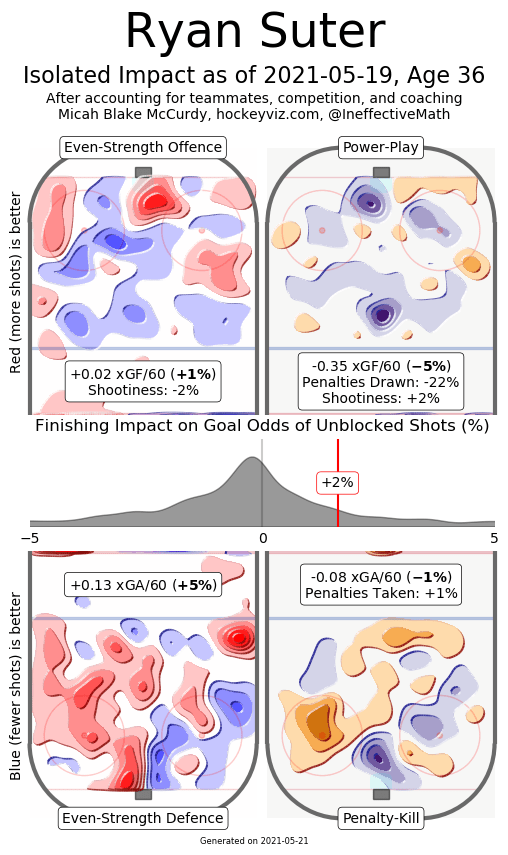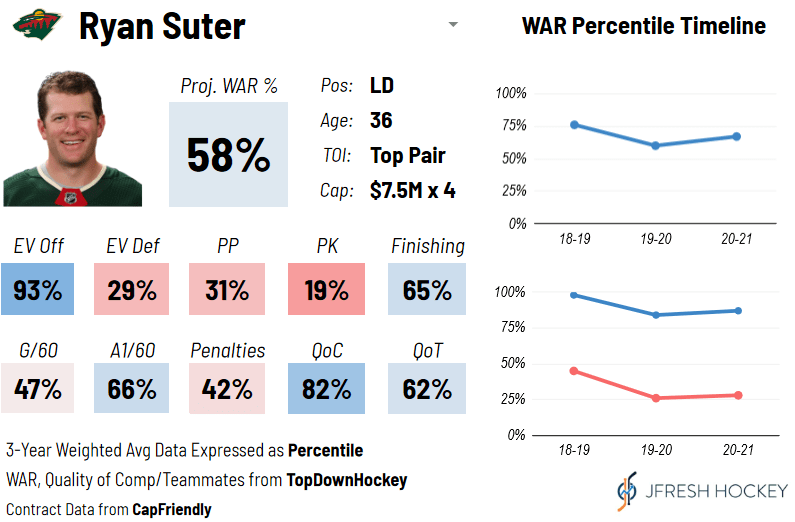© 2026 ALLCITY Network Inc.
All rights reserved.

Fun news day today in the NHL world, as the league really jumps into its offseason and gets going.
We saw the Stanley Cup dented in a boat party in Tampa Bay, Montreal’s interim head coach get a three-year deal, Pekka Rinne retired, and here in Colorado Erik Johnson agreed to waive his No-Movement Clause in order to not be protected in the expansion draft next week.
To top all of them, the Minnesota Wild made the humorous and (financially) costly decision to buy out both of the megadeals they signed back in July of 2012. You remember that, right?
When every Minnesota Wild fan with an internet connection was typing in all caps to tell the world that the self-proclaimed “State of Hockey” was back (from where?) and the Wild were about to run roughshod on the Avalanche and this was to be the golden era of the franchise.
In some ways, they were correct. The signings of both Zach Parise and Ryan Suter, the most sought-after free agents of that summer, to matching 13-year, $98 million deals was considered a coup for a franchise that had struggled to turn any of the myriad of top-10 picks into legitimate star talent. They won free agency and then all of two combined playoff rounds in their nine-year tenure and it just might have been the golden era for that organization.
Now that they’re free, I’m here to wonder what comes next. Parise seems a safe bet to head to the Islanders to reunite with the man who drafted him in Lou Lamoriello. Suter, however, could be a name to keep an eye on here in Colorado.
The Avs clearly need a little tweaking to their defensive mixture after their postseason exit against Vegas showed some cracks in the blueline. It’s still a very young group, one that is increasingly likely to see Ryan Graves exit the picture in the coming weeks, either via the expansion draft or trade (keep an eye on Arizona), and they could use a reliable veteran back there who can be a steadying force.
At age 36, Suter has been a veteran for a while now and would give the Avs protection against another injury to Johnson, who has suffered season-ending injuries each of the last two years and generally had an injury-plagued career.
I want to break this down into two parts: Why the Avs would be interested in why Suter would be. Let’s start with Colorado’s side, the more robust of the two.
Would Suter fit in Colorado?
The first step here is really important for this entire conversation. Before we even get to the on-ice stuff, it is imperative to note that the Avs and Suter are not a match until they make at least one, potentially even two moves.
Ryan Graves right now currently occupies the job Suter makes the most sense for and would likely have to be on the outs to even begin this conversation. Even if Graves moves, that still leaves Bowen Byram, Conor Timmins, and, of course, Johnson still on the defense looking for minutes.
For Byram and Timmins, they are two young players who are clearly ready for full-time NHL jobs. Would the Avs really bench one of them (likely Timmins) and just wait for an injury to put him back into the lineup just to get Suter on board?
They have to answer the depth chart questions before making any move for Suter, but doing that leads us to the most important question here from Colorado’s side: Can Suter still play?
The answer surprised me a little bit because I’ve always thought of Suter as a defensive guy who put up numbers because he was fed big minutes in all situations and it drove consistent point totals.
Looking into it, I was surprised to see how well he actually drove play offensively.

+1% isn’t exactly, you know, killing it given it’s relative to league average. And certainly the defensive numbers are actually worrisome because if suppression is Suter’s selling point, he’s lacking in that area. But let’s look at his isolated impacts. Offensively, it’s a pretty impressive profile.


That shows Minnesota’s offense is 12% better at driving player with Suter on the ice than when he wasn’t. That’s a pretty significant difference in terms of driving play. Defensively, it’s a little more encouraging than that first chart would indicate.


The suppression is great both with and without Suter as that was the real bread and butter of Minnesota’s success last year. They focused more defensively on keeping the quality limited, even if the quantity occasionally got out of hand, and leaning on their goaltender. It worked, as we saw, and Suter was still certainly part of that.
Add all of that up and you get a pretty good player at even strength. Suter’s 19 points would’ve been good for fourth on Colorado’s defense, well behind the big three (all of whom broke 30 points) but a little ahead of Graves (15 points) and the rest of the gang.
Where Suter would have to be a boon to Colorado is on the penalty kill, especially if Graves is no longer around.
When we look at Suter’s play on the PK last year, we see similar results to what we saw on even strength. A useful player who did well in the role he was given but not an overwhelming positive player.


Those are both great results for a PK and would be a significant step forward if Suter could replicate that kind of impact in place of Graves (who was a +1% on Colorado’s PK, a very bad number).
The result here is that when looking at Suter’s on-ice play, he’s still a positive contributor despite his age and, at least in theory, be helpful to making Colorado’s defense an all-around excellent group.

Going into looking into the numbers and such, I was pretty uncomfortable with the idea of the Avs specifically looking to move out players to add a player that is already 36 and on the decline, but there are some outside factors that are important to consider.
The first is that Suter’s reputation in the locker room is not great. He is notoriously prickly (as evidenced by today’s report in The Athletic that he hung up on Wild GM Bill Guerin when Guerin called Suter to inform him the team was buying him out) and has been very demanding of playing heavy minutes.
Much like when Allen Iverson famously refused to come off the bench late in his career, it appears Suter still views himself in a particular light and wants to be given a plum role by the coaching staff. In Colorado, with an ascending talent like Byram and a veteran stalwart like Johnson still in place, I don’t think Suter would get any guarantees of having a consistently prominent role.
Suter’s insistence on being a large part of the picture might also be why, despite being a productive player still, the organization decided it was best to simply move on now and eat the financial penalties. The Wild are trending much younger. Isn’t it telling that an organization going through a youth movement just moved on from the vaunted veteran leadership that Suter would supposedly bring to the locker room?
Colorado isn’t exactly a veteran’s haven like, say, St. Louis would be. It’s a very young defense on the whole and the Avs would have to be comfortable with what Suter will bring into the locker room before making any commitment.
The other conversation from Colorado’s side is money. They simply cannot afford a significant financial investment in Suter, even if it’s just for one year. They certainly can’t afford to roll the dice that Suter won’t drop off the cliff immediately by giving him a multi-year deal, which would be a 35+ contract that would not provide any cap relief in the future if Suter’s game went to pieces and the Avs wanted to buy him out.
Simply put, Suter would have to want to come to Colorado and chase a Stanley Cup on the cheap, which brings us to Suter’s side of things.
Suter’s unfinished business
Ryan Suter has been a model of defensive excellence for the last decade, maybe even a little longer. He’s aged wonderfully for a defenseman and his hockey smarts have made it so he is still an impact player even as he battles the inevitable elements of aging.
Still, there’s something left for Suter to do in the NHL. He’s never seen a deep playoff run, something that has to sting a player who was signed to be at least in some part a franchise savior of sorts. His reputation and legacy are that of a very good player but one who was only meaningful in the regular season.
Given his reaction to getting bought out, it seems fair to say that Suter isn’t thrilled with the development of losing his safety net. Depending on how pissed he truly is, he might just start gauging the interest of all the teams in Minnesota’s division in order to exact maximum revenge against Guerin and the Wild.
What better place to theoretically lift a Stanley Cup than in Denver, with the only true rival the Wild have ever really had?
In terms of money, Suter has already been paid $88 of the $98 million from his Wild contract. The Wild still owe him just under $7 million in actual cash, too, from his buyout. In the end, Suter will make just shy of $95 of the $98 million owed to him by the Wild.
That is to say, he doesn’t need to go looking for a lucrative offer. He needs opportunity, ice time, and a contender. Joining an up-and-coming team? He did that once. He should be shopping for the real deal now.
As mentioned above, Colorado can’t (read: shouldn’t) promise him a major two-way role but can offer him the ultimate revenge against the Wild on a cheap deal while also still being relatively close to home. I can tell you from personal experience that the Denver-Minneapolis flight is quick and easy with a ton of options, and that’s just from the peasant perspective that doesn’t charter private flights.
All told, Colorado can offer Suter an intriguing landing place if several things work out along the way. The Avs’ interest should still be contingent on a couple of other things happening before free agency opens on the 28th, but a cheap one-year deal would not be anything like the Brad Stuart or Francois Beauchemin moves it would inevitably get compared to.
Comments
Share your thoughts
Join the conversation



